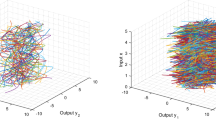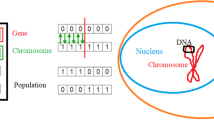Abstract
This paper proposes parameter estimation algorithms for Hammerstein nonlinear ARX systems. By making full use of the current and previous input–output data of the system, a weighted multi-innovation stochastic gradient algorithm is presented to improve the convergence rate of identification. The innovation term in the traditional identification algorithms can be treated as a particle in the particle-filtering technique, and the weight of each innovation then can be computed according to their importance. The simulation results indicate that the algorithm can improve the accuracy of parameter estimation.




Similar content being viewed by others
References
R.B. Abdennour, M. Ksouri, F.M. Sahli, Nonlinear model-based predictive control using a generalised Hammerstein model and its application to a semi-batch reactor. Int. J. Adv. Manuf. Technol. 20(11), 844–852 (2002)
T. Cui, F. Ding, A. Alsaadi, et al., Joint multi-innovation recursive extended least squares parameter and state estimation for a class of state-space systems. Int. J. Control Autom. 18 (2020)
F. Ding, T. Chen, Performance analysis of multi-innovation gradient type identification methods. Automatica 43(1), 1–14 (2007)
J. Ding, J.Z. Chen, J.X. Lin, G.P. Jiang, Particle filtering-based recursive identification for controlled auto-regressive systems with quantised output. IET Control Theory Appl. 13(14), 2181–2187 (2019)
J. Ding, J.Z. Chen, J.X. Lin, L.J. Wan, Particle filtering based parameter estimation for systems with output-error type model structures. J. Frankl. Inst. 356(10), 5521–5540 (2019)
F. Ding, Y.J. Liu, B. Bao, Gradient based and least squares based iterative estimation algorithms for multi-input multi-output systems. Proc. Inst. Mech. Eng. Part I J. Syst. Control Eng. 226(1), 43–55 (2012)
F. Ding, L. Lv, J. Pan, et al., Two-stage gradient-based iterative estimation methods for controlled autoregressive systems using the measurement data. Int. J. Control Autom. 18 (2020)
F. Ding, J. Pan, A. Alsaedi et al., Gradient-based iterative parameter estimation algorithms for dynamical systems from observation data. Mathematics 7(5), Article Number: 428 (2019). https://doi.org/10.3390/math7050428
F. Ding, F.F. Wang, T. Hayat et al., Parameter estimation for pseudo-linear systems using the auxiliary model and the decomposition technique. IET Control Theory Appl. 11(3), 390–400 (2017)
F. Ding, L. Xu, F.E. Alsaadi et al., Iterative parameter identification for pseudo-linear systems with ARMA noise using the filtering technique. IET Control Theory Appl. 12(7), 892–899 (2018)
B. Fu, C.X. Ouyang, C.S. Li, J.W. Wang, E. Gul, An improved mixed integer linear programming approach based on symmetry diminishing for unit commitment of hybrid power system. Energies 12(5), Article Number: 833 (2019). https://doi.org/10.3390/en12050833
S. Gibson, B. Ninness, Robust maximum-likelihood estimation of multivariable dynamic systems. Automatica 41(10), 1667–1682 (2005)
P.C. Gong, W.Q. Wang, F.C. Li, H. Cheung, Sparsity-aware transmit beamspace design for FDA-MIMO radar. Signal Process. 144, 99–103 (2018)
P.C. Gong, W.Q. Wang, X.R. Wan, Adaptive weight matrix design and parameter estimation via sparse modeling for MIMO radar. Signal Process. 139, 1–11 (2017)
Y. Gu, Y. Chou, J. Liu, Y. Ji, Moving horizon estimation for multirate systems with time-varying time-delays. J. Frankl. Inst. 356(4), 2325–2345 (2019)
Y. Gu, J. Liu, X. Li, Y. Chou, Y. Ji, State space model identification of multirate processes with time-delay using the expectation maximization. J. Frankl. Inst. 356(3), 1623–1639 (2019)
M.H. Li, X.M. Liu, The least squares based iterative algorithms for parameter estimation of a bilinear system with autoregressive noise using the data filtering technique. Signal Process. 147, 23–34 (2018)
M.H. Li, X.M. Liu, F. Ding, The filtering-based maximum likelihood iterative estimation algorithms for a special class of nonlinear systems with autoregressive moving average noise using the hierarchical identification principle. Int. J. Adapt. Control Signal Process. 33(7), 1189–1211 (2019)
J.H. Li, W. Zheng, J.P. Gu, L. Hua, A recursive identification algorithm for Wiener nonlinear systems with linear state-space subsystem. Circuits Syst. Signal Process. 37(6), 2374–2393 (2018)
H.J. Liang, Z.X. Zhang, C.K. Ahn, Event-triggered fault detection and isolation of discrete-time systems based on geometric technique. IEEE Trans. Circuits Syst. II, Exp. Briefs. (2019). https://doi.org/10.1109/TCSII.2019.2907706
H.J. Liang, Y.H. Zhang, T.W. Huang et al., Prescribed performance cooperative control for multiagent systems with input quantization. IEEE Trans. Cybern. (2019). https://doi.org/10.1109/TCYB.2019.2893645
Y. Liu, W.E. Bai, Iterative identification of Hammerstein systems. Automatica 43(2), 346–354 (2007)
S.Y. Liu, F. Ding, L. Xu, T. Hayat, Hierarchical principle-based iterative parameter estimation algorithm for dual-frequency signals. Circuits Syst. Signal Process. 38(7), 3251–3268 (2019)
N. Liu, S. Mei, D. Sun et al., Effects of charge transport materials on blue fluorescent organic light-emitting diodes with a host-dopant system. Micromachines 10(5), Article Number: 344 (2019). https://doi.org/10.3390/mi10050344
H. Ma, J. Pan, F. Ding et al., Partially-coupled least squares based iterative parameter estimation for multivariable output-error-like autoregressive moving average systems. IET Control Theory Appl. 14, (2020). https://doi.org/10.1049/iet-cta.2019.0112
H. Ma, J. Pan, L. Lv et al., Recursive algorithms for multivariable output-error-like ARMA systems. Mathematics 7(6), Article Number: 558 (2019). https://doi.org/10.3390/math7060558
J. Pan, X. Jiang, X.K. Wan, W. Ding, A filtering based multi-innovation extended stochastic gradient algorithm for multivariable control systems. Int. J. Control Autom. Syst. 15(3), 1189–1197 (2017)
J. Pan, W. Li, H.P. Zhang, Control algorithms of magnetic suspension systems based on the improved double exponential reaching law of sliding mode control. Int. J. Control Autom. Syst. 16(6), 2878–2887 (2018)
L.B. Pence, K.H. Fathy, L.J. Stein, Recursive maximum likelihood parameter estimation for state space systems using polynomial chaos theory. Automatica 47(11), 2420–2424 (2011)
W.X. Shi, N. Liu, Y.M. Zhou, X.A. Cao, Effects of postannealing on the characteristics and reliability of polyfluorene organic light-emitting diodes. IEEE Trans. Electron Devices 66(2), 1057–1062 (2019)
J. Voros, Recursive identification of Hammerstein systems with discontinuous nonlinearities containing dead-zones. IEEE Trans. Autom. Control 48(12), 2203–2206 (2003)
L.J. Wan, F. Ding, Decomposition- and gradient-based iterative identification algorithms for multivariable systems using the multi-innovation theory. Circuits Syst. Signal Process. 38(7), 2971–2991 (2019)
X.K. Wan, Y. Li, C. Xia et al., A T-wave alternans assessment method based on least squares curve fitting technique. Measurement 86, 93–100 (2016)
L.J. Wan, X.M. Liu, F. Ding et al., Decomposition least-squares-based iterative identification algorithms for multivariable equation-error autoregressive moving average systems. Mathematics 7(7), Article Number: 609 (2019). https://doi.org/10.3390/math7070609
Y.J. Wang, F. Ding, A filtering based multi-innovation gradient estimation algorithm and performance analysis for nonlinear dynamical systems. IMA J. Appl. Math. 82(6), 1171–1191 (2017)
L. Wang, H. Liu, L.V. Dai, Y.W. Liu, Novel method for identifying fault location of mixed lines. Energies 11(6), Article Number: 1529 (2018). https://doi.org/10.3390/en11061529
A.G. Wu, R.Q. Dong, F.Z. Fu, Weighted stochastic gradient identification algorithms for ARX models. IFAC 48(28), 1076–1081 (2015)
T.Z. Wu, X. Shi, L. Liao, C.J. Zhou, H. Zhou, Y.H. Su, A capacity configuration control strategy to alleviate power fluctuation of hybrid energy storage system based on improved particle swarm optimization. Energies 12(4), Article Number: 642 (2019). https://doi.org/10.3390/en12040642
X.P. Xie, D. Yue, C. Peng, Relaxed real-time scheduling stabilization of discrete-time Takagi–Sugeno fuzzy systems via an alterable-weights-based ranking switching mechanism. IEEE Trans. Fuzzy Syst. 26(6), 3808–3819 (2018)
X.P. Xie, D. Yue, C. Peng, Observer design of discrete-time fuzzy systems based on an alterable weights method. IEEE Trans. Cybern. (2018). https://doi.org/10.1109/TCYB.2018.2878419
L. Xu, Application of the Newton iteration algorithm to the parameter estimation for dynamical systems. J. Comput. Appl. Math. 288, 33–43 (2015)
L. Xu, The damping iterative parameter identification method for dynamical systems based on the sine signal measurement. Signal Process. 120, 660–667 (2016)
L. Xu, The parameter estimation algorithms based on the dynamical response measurement data. Adv. Mech. Eng. 9(11), 1–12 (2017). https://doi.org/10.1177/1687814017730003
L. Xu, L. Chen, W.L. Xiong, Parameter estimation and controller design for dynamic systems from the step responses based on the Newton iteration. Nonlinear Dyn. 79(3), 2155–2163 (2015)
L. Xu, W.L. Xiong, A. Alsaedi, T. Hayat, Hierarchical parameter estimation for the frequency response based on the dynamical window data. Int. J. Conrol Autom. 16(4), 1756–1764 (2018)
X. Zhang, F. Ding, L. Xu et al., A hierarchical approach for joint parameter and state estimation of a bilinear system with autoregressive noise. Mathematics 7(4), Article Number: 356 (2019). https://doi.org/10.3390/math7040356
X. Zhang, F. Ding, E.F. Yang, State estimation for bilinear systems through minimizing the covariance matrix of the state estimation errors. Int. J. Adapt. Control 33(7), 1157–1173 (2019)
X. Zhang, F. Ding, L. Xu et al., Highly computationally efficient state filter based on the delta operator. Int. J. Adapt. Control 33(6), 875–889 (2019)
X. Zhang, F. Ding, L. Xu et al., State filtering-based least squares parameter estimation for bilinear systems using the hierarchical identification principle. IET Control Theory Appl. 12(12), 1704–1713 (2018)
N. Zhao, Joint optimization of cooperative spectrum sensing and resource allocation in multi-channel cognitive radio sensor networks. Circuits Syst. Signal Process. 35(7), 2563–2583 (2016)
N. Zhao, Y. Liang, Y. Pei, Dynamic contract incentive mechanism for cooperative wireless networks. IEEE Trans. Veh. Technol. 67(11), 10970–10982 (2018)
X.L. Zhao, Z.Y. Lin, B. Fu, L. He, C.S. Li, Research on the predictive optimal PID plus second order derivative method for AGC of power system with high penetration of photovoltaic and wind power. J. Electr. Eng. Technol. 14(3), 1075–1086 (2019)
X.L. Zhao, Z.Y. Lin, B. Fu, L. He, F. Na, Research on automatic generation control with wind power participation based on predictive optimal 2-degree-of-freedom PID strategy for multi-area interconnected power system. Energies 11(12), Article Number: 3325 (2018). https://doi.org/10.3390/en11123325
Y. Zhao, G. Liu, R. David, Networked predictive control systems based on the Hammerstein model. IEEE Trans. Circuits Syst. II Express Br. 55(5), 469–473 (2008)
X.L. Zhao, F. Liu, B. Fu, F. Na, Reliability analysis of hybrid multi-carrier energy systems based on entropy-based Markov model. Proc. Inst. Mech. Eng. O-J Risk 230(6), 561–569 (2016)
N. Zhao, M.H. Wu, J.J. Chen, Android-based mobile educational platform for speech signal processing. Int. J. Electr. Eng. Educ. 54(1), 3–16 (2017)
Acknowledgements
This work was supported by the National Natural Science Foundation of China (Nos. 61473158, 61873326, 61203028) and the Natural Science Foundation of NJUPT (No. NY217063).
Author information
Authors and Affiliations
Corresponding author
Additional information
Publisher's Note
Springer Nature remains neutral with regard to jurisdictional claims in published maps and institutional affiliations.
Rights and permissions
About this article
Cite this article
Ding, J., Cao, Z., Chen, J. et al. Weighted Parameter Estimation for Hammerstein Nonlinear ARX Systems. Circuits Syst Signal Process 39, 2178–2192 (2020). https://doi.org/10.1007/s00034-019-01261-4
Received:
Revised:
Accepted:
Published:
Issue Date:
DOI: https://doi.org/10.1007/s00034-019-01261-4




